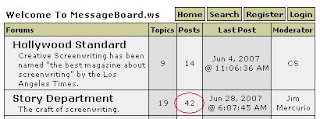The Third Digital
 My friend Michael Favelle is flying solo for the first time at the Cannes market. It will be a great experience, because he has a great film to sell. The entire line-up of Odin's Eye Ent. is pretty solid but the standout film is clearly BITTER AND TWISTED, for which the Americans fell in a big way earlier this month. It happened at De Niro's Tribeca film festival in New York. And even Michael Moore plays a role in the success story.
My friend Michael Favelle is flying solo for the first time at the Cannes market. It will be a great experience, because he has a great film to sell. The entire line-up of Odin's Eye Ent. is pretty solid but the standout film is clearly BITTER AND TWISTED, for which the Americans fell in a big way earlier this month. It happened at De Niro's Tribeca film festival in New York. And even Michael Moore plays a role in the success story.
Flashback to August 2007.
Michael Favelle shows me BITTER AND TWISTED and I dig it. He knows this doesn't happen too often. The writing is dramatic and fresh, the direction shows a strong hand and the production design is splendid, showing a disciplined economy. The film stands out above anything I have recently seen. Days later I bump into Christopher Weekes, the writer/director/actor and I congratulate him on his amazing achievement.
Flash forward to late 2007.
I am writing a post-production plan for a feature with my fellow producer Brendan Sloane. The film is THE DINNER PARTY, competently written and directed by Scott Murden, an obvious talent from Canberra. Together with the creative team I find a way to improve the strength of the story on the basis of minimal pickups and one new major scene. It is a tremendous pleasure and we are all excited about the prospects.
Soon after, I learn B&T is competing in the same funding strand against THE DINNER PARTY. Bugger. We have a great project with a clear strategy for improvement but B&T is a monumental competitor.
When after weeks of uncertainty I hear we are selected and B&T isn't, I have mixed feelings about it.
Now, what has happened with THE DINNER PARTY since is another story and I won't go detail. What I can tell you, is that its completion is moving towards what is looking like a very happy ending.
I admit, up until this point, my story is pretty lame. Shit happens. Nobody is perfect. Judges make mistakes. Flashback to September 2007 for the climax and resolution.
Flashback to September 2007 for the climax and resolution.
I am at the Odin's Eye offices. the atmosphere is gloomy. The funding agency doesn't agree with our excitement over B&W. The film has been rejected. Again. There is no money to complete post-production.
Before I get to the point, let me ask you this: how should a film at fine cut stage be judged? You watch it, right?
Wrong.
Believe it or not, but although the film was offered in a fine cut, the rejection was largely based on a reading of the screenplay.
Sorry, but what am I missing here???
To award that highest culinary distinction of a Michelin star, would the judge study the chef's recipe book?
To check the baby's health, does the doctor go back and screen dad's sperm and mum's egg?
In stead of visiting the Sistine chapel, would you rather stay outside and watch the pics in your Lonely Planet?
I mean, really... What planet do these people live on?
Here's the irony. While you were reading this article, Michael in Cannes has closed another deal and Christopher has been offered another movie to direct.
Let's wake up to the real world and learn to acknowledge and admit when stories are crap. But use reasonable standards and tools to judge films. Perhaps this will help revitalising an industry built upon egos, ignorance and one-hit-wonders.After having let the above article rest for a while, I feel compelled to set one thing straight: over the past couple of years I have personally had completely positive experiences in dealing with government agencies. As a matter of fact, recent dealings have been wonderful and promising for the future of development. However this does in no way diminish my feelings about the above.
THE WELL. TREAT IT WELL During the interview with Larry Jordan I mentioned one of my firm beliefs with regard to story development as an editor/consultant. What follows may be a tip for writers that are working closely with editors, producers, directors or just teams of co-writers.
During the interview with Larry Jordan I mentioned one of my firm beliefs with regard to story development as an editor/consultant. What follows may be a tip for writers that are working closely with editors, producers, directors or just teams of co-writers.
Most early draft screenplays have one or more tentpole scenes that sooner or later will have to disappear. To an outsider this may be instantly obvious and it would be tempting to recommend the immediate removal of such scene(s).
This, however, is a perfect way to kill a complete story.
Over the years I have learned to understand that the excitement and inspiration of a writer to work on a story often springs from only a handful of scenes.
Some writers, even experienced filmmakers, are totally protective of those. For good reason.
Others have complete confidence in the advice of the consultant and will dispose of the scene at once. The development will stumble on, for a short or longer while. Ultimately the writer will lose interest in the story. The source of inspiration was plugged.
When this scene is not completely obstructing the flow of a story, I will recommend to 'leave it in for now'. If it is obviously of inferior quality or just plain wrong, I will ask the writer to 'park' it. Never delete, just put it aside "for later". Here is the one feature I really do like about Final Draft: the 'Omit Scene'. It just hides the scene. It really is still there, and you can always make it reappear if you feel so inclined.
Sometimes I refer to the story of Brian De Palma's repeated attempts to reference Eisenstein's Odessa Steps scene from BATTLESHIP POTEMKIN. It took him many years before he found a home for the scene: in THE UNTOUCHABLES.
Think twice before you excise.
WELCOME TO THE STORY DEPT. - PREMIUM ED. The three winners of last months Premium giveaway are:
The three winners of last months Premium giveaway are:
- 1. tefferm
- 2. rshaver
- 3. rclim24
To protect the winners from internet spam, I have hidden their full email addresses but after receipt of this newsletter they may expect an email with the login and password for the Premium site. This will remain valid for a full year. Congratulations!
I am encouraged to run the same competition again, only this time I am asking a little extra.
For my workshops and Premium Ed. web site, I am looking for case studies, synopses that I can review and possibly improve as an example of a story diagnosis. So, apart from entering your email address at the top left of this page, this time you will need to fulfill one more qualifying task to enter into the competition.
If you have a synopsis of an abandoned story idea, or a project in development that you would like to share publicly, email it to me and I may give it a detailed analysis on the blogsite. Your reward: one year free subscription to the Premium Ed. PLUS an improved draft of your synopsis.
Are you brave?
The three winners will get:
- Premium Articles direct to your email inbox
- The Story Dept. - Basic Edition (this newsletter)
- 15% off Options One and/or Two
- Discounted rates to selected workshops
(* The prize does NOT include the free Story Diagnosis. Or actually ... it might.)
If you are just interested in receiving news from The Story Dept. as and when I write it, have a look at the different subscription options. Most are free, only one is Premium.




































